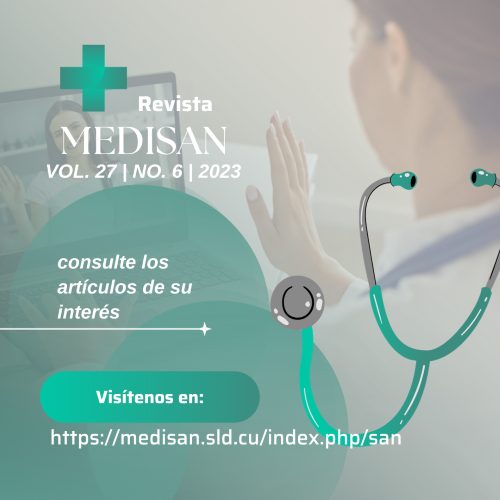Formación investigativa de docentes universitarios para el aprendizaje sincrónico durante la covid-19
Palabras clave:
aprendizaje, educación a distancia, enseñanza, educación superior.Resumen
Introducción: Las capacitaciones permanentes durante la pandemia posibilitaron el aprendizaje en la educación superior.
Objetivo: Describir la formación investigativa y la función pedagógica en docentes universitarios desde la complejidad psicosocial del aprendizaje sincrónico durante la covid-19.
Métodos: Se efectuó un estudio desde julio del 2020 hasta febrero del 2022 en la Universidad Nacional San Luis Gonzaga de Ica, en Perú. La formación investigativa consistió en 2 modalidades: talleres de formación y cursos de posgrado, y se registró la participación de las áreas académicas de ciencias de la salud, ingenierías y letras y humanidades. Se describió mediante un dendrograma la función pedagógica entre dos grupos de profesores (con asistencia permanente o no).
Resultados: En los talleres de formación, 52,0 % de los asistentes correspondió al área académica de ciencias de la salud, 35,0 % a letras y humanidades y 13,0 % a ingenierías; mientras la participación activa fue de 22,2 % en ingeniería, 8,9 % en ciencias de la salud y 4,1 % en letras y humanidades. En cambio, el porcentaje para los cursos de posgrado fue de 41,0 en ciencias de la salud, 30,0 en letras y humanidades y 29,0 en ingenierías, con participación activa de 6, 4 y 3 docentes, respectivamente. No hubo diferencias significativas en la evaluación interna entre los cursos de posgrado (p<0,00915).
Conclusiones: La asistencia fue menor en los cursos de posgrado al ser más riguroso el proceso de aprendizaje; sin embargo, fue mayor la participación activa. Existió mayor similitud en la función pedagógica cuando la asistencia fue permanente.
Descargas
Citas
2. Sandhu P, de Wolf M. The impact of COVID-19 on the undergraduate medical curriculum. Medical Education Online. 2020 [citado 10/06/2023];25(1):1-2. Disponible en: https://www.tandfonline.com/doi/epdf/10.1080/10872981.2020.1764740?needAccess=true
3. Rojanaworarit C, El Bouzaidi S. Building a resilient public health system for international migrant workers: A case study and policy brief for COVID-19 and beyond. Journal of Health Research. 2022 [citado 08/05/2023];36(5):898-907. Disponible en: https://www.emerald.com/insight/content/doi/10.1108/JHR-01-2021-0035/full/pdf?title=building-a-resilient-public-health-system-for-international-migrant-workers-a-case-study-and-policy-brief-for-covid-19-and-beyond
4. Ali W. Online and Remote Learning in Higher Education Institutes: A Necessity in light of COVID-19 Pandemic. Higher Education Studies. 2020 [citado 22/05/2023];10(3):16-25. Disponible en: https://ccsenet.org/journal/index.php/hes/article/download/0/0/42784/44703
5. König J, Jäger Biela DJ, Glutsch N. Adapting to online teaching during COVID-19 school closure: teacher education and teacher competence effects among early career teachers in Germany. European Journal of Teacher Education. 2020 [citado 26/04/2023];43(4),608-22. Disponible en: https://www.tandfonline.com/doi/epdf/10.1080/02619768.2020.1809650?needAccess=true
6. Fuchs K. The Difference Between Emergency Remote Teaching and e-Learning. Front. Educ. 2022 [citado 29/04/2023];7:1-3. Disponible en: https://www.frontiersin.org/articles/10.3389/feduc.2022.921332/pdf?isPublishedV2=False
7. Al Lily AE, Ismail AF, Abunasser FM, Alhajhoj Alqahtani RH. Distance education as a response to pandemics: Coronavirus and Arab culture. Technology in Society. 2020 [citado 12/04/2023];63:1-11. Disponible en: https://www.sciencedirect.com/science/article/pii/S0160791X20303006/pdfft?md5=ae4655551e49df95aef728e504520418&pid=1-s2.0-S0160791X20303006-main.pdf
8. Bangert K, Bates J, Beck SBM, Bishop ZK, Di Benedetti M, Fullwood J, et al. Remote practicals in the time of coronavirus, a multidisciplinary approach. International Journal of Mechanical Engineering Education. 2020 [citado 18/04/2023];50(2):219-39. Disponible en: https://journals.sagepub.com/doi/pdf/10.1177/0306419020958100?download=true
9. Hansen G, Ringdal R. Formative assessment as a future step in maintaining the mastery-approach and performance-avoidance goal stability. Studies in Educational Evaluation. 2018 [citado 22/04/2023];56:59-70. Disponible en: https://doi.org/10.1016/j.stueduc.2017.11.005
10. Gibson P, Janikova J. Moral Injury, Psychological Ill-Health, and Severe Stress among COVID-19 Frontline Respiratory and Intensive Care Physicians and Nurses. Psychosociological Issues in Human Resource Management. 2021 [citado 22/04/2023];9(2):77-90. Disponible en: https://doi.org/10.22381/pihrm9220216
11. Nemteanu MS, Dabija DC. The Influence of Internal Marketing and Job Satisfaction on Task Performance and Counterproductive Work Behavior in an Emerging Market during the COVID-19 Pandemic. Int J Environ Res Public Health. 2021 [citado 26/03/2023];18(7). Disponible en: https://doi.org/10.3390/ijerph18073670
12. Brandt JO, Bürgener L, Barth M, Redman A. Becoming a competent teacher in education for sustainable development: Learning outcomes and processes in teacher education". International Journal of Sustainability in Higher Education. 2019 [citado 28/04/2023];20(4):653-30. Disponible en: https://doi.org/10.1108/IJSHE-10-2018-0183
13. Hetherington RW, Merk H, Waggoner J, Carroll J, Weitzel B. Partnering with School Leaders: Principal Assessments of completers. Journal of Education & Social Policy. 2019 [citado 14/03/2023];6(3):59-65. Disponible en: http://jespnet.com/journals/Vol_6_No_3_September_2019/9.pdf
14. Dunst CJ, Hamby DW, Howse RB, Wilkie H, Annas K. Research Synthesis of Meta-Analyses of Preservice Teacher Preparation Practices in Higher Education. Higher Education Studies. 2020 [citado 09/06/2023];10(1):29-47. Disponible en: https://ccsenet.org/journal/index.php/hes/article/download/0/0/41392/42849
15. Wallin A, Nokelainen P, Mikkonen S. How experienced professionals develop their expertise in work-based higher education: a literature review. Higher Education. 2019;77:359-78.
16. Cebrián G, Junyent M, Mulà I. Competencies in Education for Sustainable Development: Emerging Teaching and Research Developments. Sustainability. 2020 [citado 02/08/2023];12(2):579. Disponible en: https://doi.org/10.3390/su12020579
17. Waltner EM, Rieß W, Mischo C. Development and Validation of an Instrument for Measuring Student Sustainability Competencies. Sustainability. 2019 [citado 13/09/2023];11(6):1717. Disponible en: https://doi.org/10.3390/su11061717
18. Wamsler C. Mind the gap: the role of mindfulness in adapting to increasing risk and climate change. Sustain Sci. 2018 [citado 11/08/2023];13:1121-35. Disponible en: https://link.springer.com/content/pdf/10.1007/s11625-017-0524-3.pdf
19. Ormazábal I, Borotto FA, Astudillo HF. An agent-based model for teaching-learning processes. Physica A: Statistical Mechanics and its Applications. 2021 [citado 17/07/2023];565. Disponible en: https://doi.org/10.1016/j.physa.2020.125563
20. Humrickhouse E. Flipped classroom pedagogy in an online learning environment: A self-regulated introduction to information literacy threshold concepts. The Journal of Academic Librarianship. 2021 [citado 17/07/2023];47(2). Disponible en: https://doi.org/10.1016/j.acalib.2021.102327
Publicado
Cómo citar
Número
Sección
Licencia
Esta revista provee acceso libre e inmediato a su contenido bajo el principio de que hacer disponible gratuitamente investigación al público, apoya aún más el intercambio de conocimiento global. Esto significa que los autores/as conservarán sus derechos de autor y garantizarán a la revista el derecho de primera publicación de su obra, el cuál estará simultáneamente sujeto a la licencia internacional Creative Commons Atribución 4.0 que permite copiar y redistribuir el material en cualquier medio o formato para cualquier propósito, incluso comercialmente, además de remezclar, transformar y construir a partir del material para cualquier propósito.





